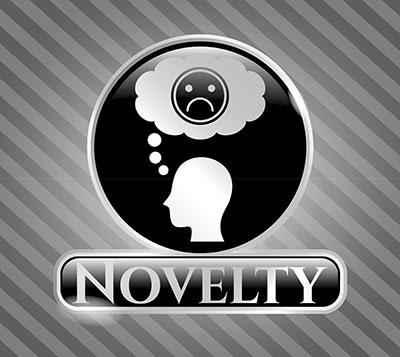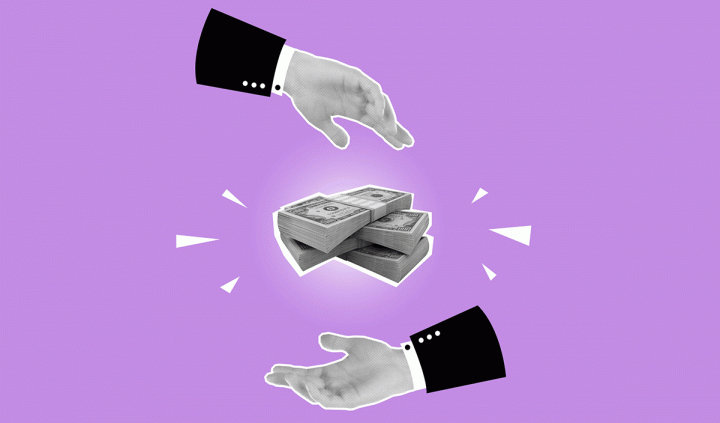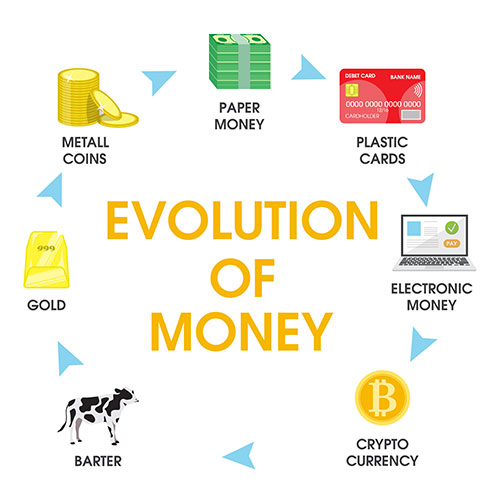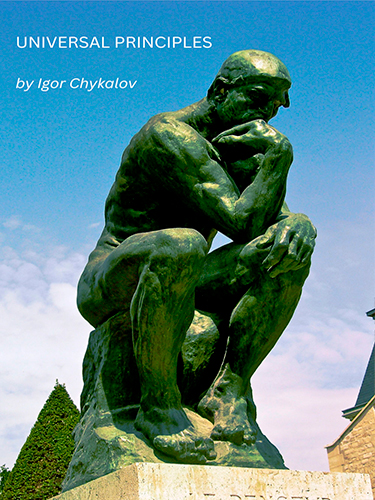Comment on Novelty
This is my original commentary to an article at Medium.com about novelty, mind, Buddha and living in the future (October 25, 2019).
I’ve already written a commentary on another Zat Rana's article before. The impression from “The Purpose of Life Used to Be Presence. Today, It’s Novelty” is the same. I can call it intellectual masturbation, as these reflections do not lead to anything practical and every time I hardly push myself to read the article to the end.
Our Universe was born in the Big Bang and at that moment 2 interrelated oppositions emerged - Yin (matter) and Yang (energy). The first 2 pairs of consequences of Yin-Yang interaction were Darkness/Light and Cold/Heat. And then gradually all variety of non-living and living objects of our universe was formed - from galaxies and planets to the first organic compounds, unicellular organisms and then plants and animals on the Earth. Life on Earth is created, maintained, and manipulated by the interaction of Yin and Yang.
All biological species on the Earth including humans live their lives, being directed by Yin-Yang duality, always moving from pain/death towards satisfying the basic needs (and thus to keep living). Humans turned the needs into the pleasures (like a food can be used as a dainty) and the misery (the obesity in that example) emerged as the inevitable reimbursement. It is easier to deal with animals - they don’t have human Self-Awareness and thus their demands are much lower. They just follow their path with no questions, sleep where they can, eat what they find, and are basically “happy”, not being aware of such a term. Humans are endowed with Self-Awareness, so they (and the author of the article) also follow their path, but they ask a lot of questions along the way - “why we are going there, why we are unhappy and what makes us move in this direction”. It would be good to understand first what Mind, Thought, Consciousness, Path, etc are about to reflect on this topic well. As a result of not-sufficient understanding, incomplete answers to vague questions arise such as this article.
The article is not clear and is not much insightful. Who clearly thinks that clearly states. I agree with some things and disagree with others. For example, the author invents the Novelty, which is the “sixth sense” and the new creative look at the routine things, which is the product of human thought (or mind), which pushes the decision-making process into the future instead of the present...
![Comment on Novelty]()
Image from Shutterstock
It is a far-fetched assumption which looks too complicated. Yes, I agree, the mankind really lives more in the future now, which means to be detached from the present and not to remember the mistakes of the past. In my opinion, mankind is really at this very stage of its development (or degradation). But this is a state of an optimistic schizophrenic. If you go out to the street in such a state, you will easily get hit by a car.
I’d like to quote the words of Lao Tzu in this regard, also being said around 2500 years ago: “If you are depressed you are living in the past. If you are anxious, you are living in the future. If you are at peace, you are living in the present.”
And a couple of words about Buddha.
I’m not a fan of his teaching because it’s slightly not for the humans. To be a human means to talk and act (although people often talk nonsense and act against their own good). Without any of those two gifts, there is not much sense to live. So a human being is more Yang entity than Yin one, an active agent which is oriented outward.
The Buddha’s teaching leads in the opposite direction - the withdrawal inside and meditations, which is correct, unless the aim of all that is the reaching of nirvana. However, all of us were already in nirvana state before our birth and everybody will get there after the death. Yes, Buddhists speak about leaving the wheel of incarnations, but not everybody can leave it at once and just because he wants to. It is a hierarchical process, so not everybody is so “lucky”. All the inhabitants of the Earth (including every grass blade and flower) are in the incarnation wheel of evolution. And Buddha was in it too until he died. He may not be returned to Earth anymore, but that doesn’t mean that he has paid for his Karma in full and reached his moksha.
He has only reached the enlightenment/awakening.
There is an interesting saying in esoteric circles: “Stupid before the enlightenment and stupid after”.
It can be applied to the whole human race - me, the author of the article, and Buddha also, since he has got his enlightenment as a human being in the physical body. So it is not obvious whether he was right in his teaching or wrong. What I know is that each cognition is limited by the capabilities of the physical body (the 5 senses that the author talks about in the article), so Buddha perceived just what his human body allowed. In addition, his teaching began to be recorded 400 years after his death, i.e. it was someone else’s interpretation and what he was actually saying is unknown.
And meditations (or just contemplations) are really necessary, but not to reach the nirvana. Nirvana is not a question of our competence.
P.S. Dear Reader! I am very much interested in your opinion on the subject of this article. Please, write a comment or ask a question if you want to clarify something.
Yours,
Igor Chykalov
..........
I’ve already written a commentary on another Zat Rana's article before. The impression from “The Purpose of Life Used to Be Presence. Today, It’s Novelty” is the same. I can call it intellectual masturbation, as these reflections do not lead to anything practical and every time I hardly push myself to read the article to the end.
Our Universe was born in the Big Bang and at that moment 2 interrelated oppositions emerged - Yin (matter) and Yang (energy). The first 2 pairs of consequences of Yin-Yang interaction were Darkness/Light and Cold/Heat. And then gradually all variety of non-living and living objects of our universe was formed - from galaxies and planets to the first organic compounds, unicellular organisms and then plants and animals on the Earth. Life on Earth is created, maintained, and manipulated by the interaction of Yin and Yang.
All biological species on the Earth including humans live their lives, being directed by Yin-Yang duality, always moving from pain/death towards satisfying the basic needs (and thus to keep living). Humans turned the needs into the pleasures (like a food can be used as a dainty) and the misery (the obesity in that example) emerged as the inevitable reimbursement. It is easier to deal with animals - they don’t have human Self-Awareness and thus their demands are much lower. They just follow their path with no questions, sleep where they can, eat what they find, and are basically “happy”, not being aware of such a term. Humans are endowed with Self-Awareness, so they (and the author of the article) also follow their path, but they ask a lot of questions along the way - “why we are going there, why we are unhappy and what makes us move in this direction”. It would be good to understand first what Mind, Thought, Consciousness, Path, etc are about to reflect on this topic well. As a result of not-sufficient understanding, incomplete answers to vague questions arise such as this article.
The article is not clear and is not much insightful. Who clearly thinks that clearly states. I agree with some things and disagree with others. For example, the author invents the Novelty, which is the “sixth sense” and the new creative look at the routine things, which is the product of human thought (or mind), which pushes the decision-making process into the future instead of the present...

Image from Shutterstock
It is a far-fetched assumption which looks too complicated. Yes, I agree, the mankind really lives more in the future now, which means to be detached from the present and not to remember the mistakes of the past. In my opinion, mankind is really at this very stage of its development (or degradation). But this is a state of an optimistic schizophrenic. If you go out to the street in such a state, you will easily get hit by a car.
I’d like to quote the words of Lao Tzu in this regard, also being said around 2500 years ago: “If you are depressed you are living in the past. If you are anxious, you are living in the future. If you are at peace, you are living in the present.”
And a couple of words about Buddha.
I’m not a fan of his teaching because it’s slightly not for the humans. To be a human means to talk and act (although people often talk nonsense and act against their own good). Without any of those two gifts, there is not much sense to live. So a human being is more Yang entity than Yin one, an active agent which is oriented outward.
The Buddha’s teaching leads in the opposite direction - the withdrawal inside and meditations, which is correct, unless the aim of all that is the reaching of nirvana. However, all of us were already in nirvana state before our birth and everybody will get there after the death. Yes, Buddhists speak about leaving the wheel of incarnations, but not everybody can leave it at once and just because he wants to. It is a hierarchical process, so not everybody is so “lucky”. All the inhabitants of the Earth (including every grass blade and flower) are in the incarnation wheel of evolution. And Buddha was in it too until he died. He may not be returned to Earth anymore, but that doesn’t mean that he has paid for his Karma in full and reached his moksha.
He has only reached the enlightenment/awakening.
There is an interesting saying in esoteric circles: “Stupid before the enlightenment and stupid after”.
It can be applied to the whole human race - me, the author of the article, and Buddha also, since he has got his enlightenment as a human being in the physical body. So it is not obvious whether he was right in his teaching or wrong. What I know is that each cognition is limited by the capabilities of the physical body (the 5 senses that the author talks about in the article), so Buddha perceived just what his human body allowed. In addition, his teaching began to be recorded 400 years after his death, i.e. it was someone else’s interpretation and what he was actually saying is unknown.
And meditations (or just contemplations) are really necessary, but not to reach the nirvana. Nirvana is not a question of our competence.
-------------------------------------------------------------------------
P.S. Dear Reader! I am very much interested in your opinion on the subject of this article. Please, write a comment or ask a question if you want to clarify something.
Yours,
Igor Chykalov
Comment
✚ Add comment







